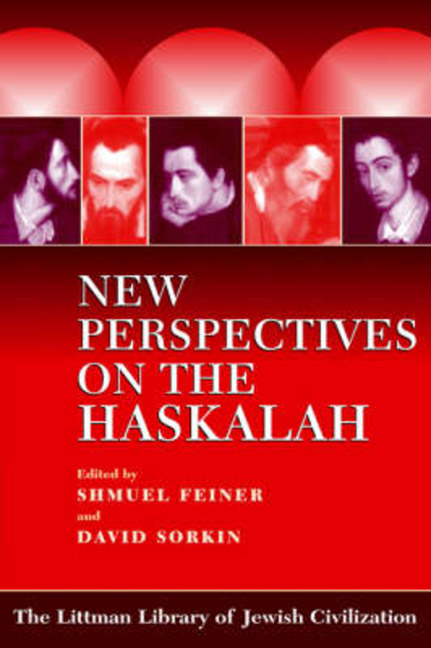Book contents
- Frontmatter
- Preface
- Contents
- Note on Transliteration
- Introduction
- 1 The Early Haskalah
- 2 Naphtali Herz Wessely and the Cultural Dislocations of an Eighteenth-Century Maskil
- 3 Enlightenment Values, Jewish Ethics: The Haskalah's Transformation of the Traditional Musar Genre
- 4 Was there a ‘Haskalah’ in England? Reconsidering an Old Question
- 5 Strategy and Ruse in the Haskalah of Mendel Lefin of Satanow
- 6 The Struggle of the Mitnagedim and Maskilim against Hasidism: Rabbi Jacob Emden and Judah Leib Mieses
- 7 Magic and Miracle-Workers in the Literature of the Haskalah
- 8 Portrait of the Maskil as a Young Man
- 9 Reality and its Refraction in Descriptions of Women in Haskalah Fiction
- 10 Enlightened Rabbis as Reformers in Russian Jewish Society
- 11 Towards a Historical Definition of the Haskalah
- Glossary
- Notes on Contributors
- Bibliography
- Index
10 - Enlightened Rabbis as Reformers in Russian Jewish Society
- Frontmatter
- Preface
- Contents
- Note on Transliteration
- Introduction
- 1 The Early Haskalah
- 2 Naphtali Herz Wessely and the Cultural Dislocations of an Eighteenth-Century Maskil
- 3 Enlightenment Values, Jewish Ethics: The Haskalah's Transformation of the Traditional Musar Genre
- 4 Was there a ‘Haskalah’ in England? Reconsidering an Old Question
- 5 Strategy and Ruse in the Haskalah of Mendel Lefin of Satanow
- 6 The Struggle of the Mitnagedim and Maskilim against Hasidism: Rabbi Jacob Emden and Judah Leib Mieses
- 7 Magic and Miracle-Workers in the Literature of the Haskalah
- 8 Portrait of the Maskil as a Young Man
- 9 Reality and its Refraction in Descriptions of Women in Haskalah Fiction
- 10 Enlightened Rabbis as Reformers in Russian Jewish Society
- 11 Towards a Historical Definition of the Haskalah
- Glossary
- Notes on Contributors
- Bibliography
- Index
Summary
HISTORICAL research has paid little attention to the ‘enlightened rabbi’ type in eastern Europe in the 1860s and 1870s. Such rabbis combined tradition and enlightenment, a trait that made them potentially and practically social reformers in the sense that they took a stand on social issues and were willing to examine them anew in the light of their intellectual commitments. The different combinations of enlightenment and tradition explain the various rabbinical positions taken in regard to the proposed reforms of Jewish society. Advocating nationalism was only one of the options suggested by this group, and it was not their first choice.
There is a prevalent distinction in the literature between traditional and enlightened Jews in Russian Jewish society in the second half of the nineteenth century, as well as one between the moderate or conservative members of the Haskalah and those who were more radical. Nineteenth-century writers coined the terms ḥaredim maskilim (enlightened religious Jews) and maskilim yesharim (moderate maskilim), and in the past few decades the expressions ‘enlightened rabbi’ and ‘enlightened Torah scholar’ have been used; attention has also been paid to the expressions used by enlightened Jews themselves, such as haskalah datit (religious Haskalah) and maskilim min hatorah (Jews whose Haskalah is based on the Torah). But all these expressions are meant to denote more or less the same type of east European Jew, one who up to now has been deprived of his rightful place in the historiography of east European Jewry. Binary thinking has made it difficult for scholars to envisage a pluralist social structure with a broad range of positions and human types.
The many studies of the Haskalah in Lithuania have repeatedly shown that the maskilim were traditional Jews whose education included not only Hebrew grammar and medieval Jewish thought but also knowledge of other languages, as well as of the philosophical and aesthetic literature of their times. This education was carried out through the initiative of parents or other available teachers. A lively description appears in Solomon Maimon's autobiography, which provides a picture of the 1760s and 1770s: he lists the books belonging to his father, who was a merchant in the city of Königsberg, as well as the books he borrowed from Rabbi Shimshon of Slonim.
- Type
- Chapter
- Information
- New Perspectives on the Haskalah , pp. 166 - 183Publisher: Liverpool University PressPrint publication year: 2001



